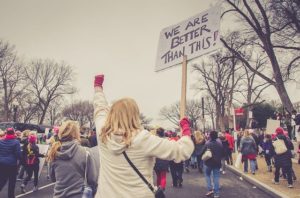© 2020 Richard Jernigan
© 2020 International Urantia Association (IUA)
| Journal Editorial – November 2020 | Journal — November 2020 — Index | Living the Gospel and Proclaiming with Power in the 21st Century |
¶ How Do We Reconcile Living in the Kingdom and Living in the World?

(Editor’s note: This is from a presentation given at the 2018 Urantia Association International conference in the Netherlands)
Politics are an intense and unavoidable part of being human. Each day, politics intrudes into our news feeds and our daily lives. Political awareness and opinion are just as diverse and impassioned among Urantia Book readers as they are throughout the rest of the world. Just look at Urantia Book reader comments on social media to get a taste of that.
So as readers, how do the teachings of The Urantia Book inform our politics? How should they inform our politics?
Jesus was fully cognizant of his world’s political and economic problems. In a conference one day on the Sea of Galilee with Peter, James, and John, he had a frank conversation about how his apostles should deal with politics, economics, and social issues. “He recognized the need for social justice and industrial fairness, but he offered no rules for their attainment” [UB 140:8.15]. The writers in this section say Jesus was not a political reformer, and we should “never make the mistake of associating Jesus with a particular political or economic theory, with any social or industrial system” [UB 140:8.10]. Jesus instead sought to “make all men Godlike and then stand by sympathetically while these sons of God solve their own political, social, and economic problems” [UB 140:8.18]. Jesus’ great focus was to teach us without qualification that God is our loving father and that we are all brothers and sisters. Regardless of who we are and what we believe, the universe is one vast family.
Jesus did not offer rules or methods for social justice and industrial fairness, because whatever he might have offered as a solution would only work for that time and those circumstances. This does not mean we ignore these issues. After all, the text says, “he did frequently call attention to the injustice of the unequal distribution of wealth” [UB 140:8.15].
While the first goal of Jesus’ teachings and the teachings of The Urantia Book itself is our personal spiritual transformation, it follows that we need to be good citizens in our communities; our provinces, regions, landers, and states; our nations, and our world.
Social justice and industrial fairness: what do they look like in terms of Jesus’ teachings?
For starters, we can look at a statement appearing in the section on Jesus’ Urmia lectures. The Most Highs rule in the kingdoms of men, and their goal is “to foster the greatest good to the greatest number of all men” (and yes, this includes women and children!) “and for the greatest length of time” [UB 134:5.4].
The greatest good, for the greatest number of all people, and for the greatest length of time.
A powerful statement for two reasons: it includes all people, and for the greatest period of time. We don’t just divide up all the cash and make everyone happy for a few days. This is about sustainable solutions. Long lasting solutions. Systemic solutions that benefit humanity for great stretches of time. This involves political action and setting up governments that facilitate this work in an organized, systematic, predictable way, so that we indeed help achieve the greatest good, for the greatest number of people, for the greatest period of time.

In Paper 71, The Urantia Book clearly frames the features of progressive civilization and the ideal state. It makes targeted statements about ensuring both personal liberties and the common good, about building an effective society that facilitates human self-realization and augments cosmic insight. The paper makes clear statements about ideal government being of the people, controlled by the people, and benefiting the people. It clearly measures progress in terms of abolition of slavery, enactment of public education, full employment, freedom of expression, promotion of science, care of the unfortunate, and many other attributes most of us enjoy to a greater or lesser degree in each of our native countries.
The reality disclosed by The Urantia Book is one of justice, fairness, compassion, and mercy. For all people. Regardless of one’s religion or lack of religion, wealth or poverty, intellectual strength or weakness. Each of us has a personality “without duplicate in infinity … irreplaceable in all eternity” [UB 12:7.9].
As faithful students of this text, this should have profound repercussions on our political, social, and economic attitudes. We should be active in pursuing justice, fairness, and equity in every realm of our lives. We have a duty to be good citizens of our world.
Wednesday before Jesus was arrested, he sat down with fifty of his followers and talked with them about how they should interact with civil government. Certainly, as apostles and disciples, their first loyalty was to the kingdom of God but, in modern language, he told these men and women:
There is nothing incompatible between sonship in the spiritual kingdom and citizenship in the secular or civil government. It is the believer’s duty to render to Caesar the things which are Caesar’s and to God the things which are God’s. There cannot be any disagreement between these two requirements, the one being material and the other spiritual, unless it should develop that a Caesar presumes to usurp the prerogatives of God and demand that spiritual homage and supreme worship be rendered to him. [UB 178:1.3]
Fortunately, no one today is dealing with the dictatorial Caesars of Jesus’ time. But we aren’t far from the time in which dictators ruled nations on this continent. The developed nations that most of us here live in today, more or less, are by the people and for the people. Hooray for that. With that working in our favor we, as Urantia Book readers and followers of Jesus, have ample opportunity to influence governments toward the greater good, and, for that matter, toward light and life.
Jesus went on to say in this passage that it was his followers’ duty to get close to the politicians and governors and be models of social service.
Sonship in the kingdom, from the standpoint of advancing civilization, should assist you in becoming the ideal citizens of the kingdoms of this world since brotherhood and service are the cornerstones of the gospel of the kingdom. The love call of the spiritual kingdom should prove to be the effective destroyer of the hate urge of the unbelieving and war-minded citizens of the earthly kingdoms. But these material-minded sons in darkness will never know of your spiritual light of truth unless you draw very near them with that unselfish social service which is the natural outgrowth of the bearing of the fruits of the spirit in the life experience of each individual believer. [UB 178:1.4]
As we engage in politics, and many of us do, including myself, I see three responsibilities as students of The Urantia Book.
- We have a responsibility to engage in politics with intelligence. To be informed. To know how to distinguish between solid news and propaganda. To know what is real science and what is a conspiracy theory or an urban myth.
- We have a responsibility to do this with civility. Regardless of our positions, and of the passion with which we hold our views, we express them with facts, with reason, and with respect for anyone holding an opposing view. Because they are a beloved child of God.
- And we have a responsibility to do this with compassion. “Jesus’ compassion was boundless, his sympathy was practical, personal, and constructive” [UB 171:7.3].
The Urantia Book is out in the world, freely and easily available. Each of us who have been changed by this book are ambassadors of this book. How we live our lives reflects on the teachings. Each of our acts of divinity grows our souls. Each of our acts of truth, beauty, and goodness nudges us toward life and life.
Along with many millions of others, we represent Jesus in the world.
¶ References
| Journal Editorial – November 2020 | Journal — November 2020 — Index | Living the Gospel and Proclaiming with Power in the 21st Century |